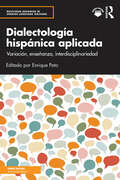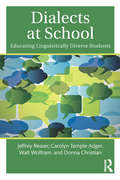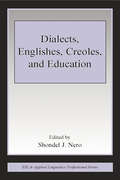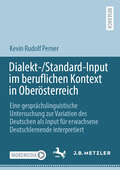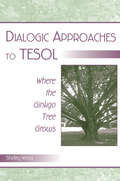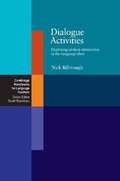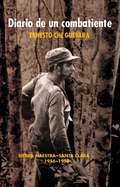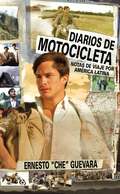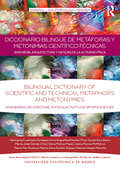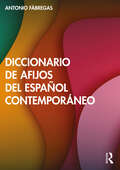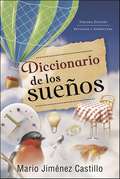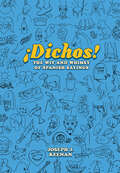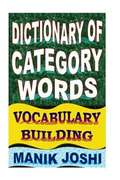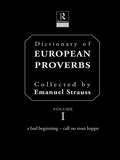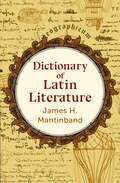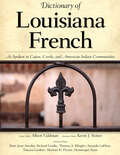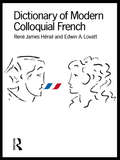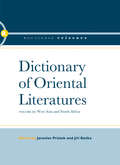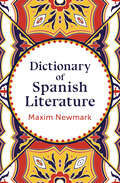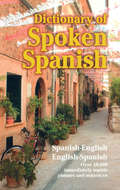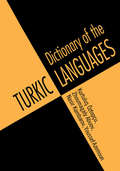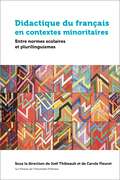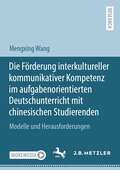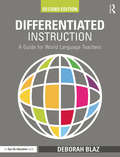- Table View
- List View
Dialectología hispánica aplicada: Variación, enseñanza, interdisciplinariedad (Routledge Advances in Spanish Language Teaching)
by Enrique PatoDialectología hispánica aplicada. Variación, enseñanza, interdisciplinariedad es un libro de referencia tanto para el estudio como para la investigación en dialectología hispánica y su aplicación a la enseñanza de lenguas.El libro ha sido cuidadosamente concebido para introducir al lector en las principales áreas de las variedades del español (en España, América, Filipinas, Guinea Ecuatorial y en contacto con otras lenguas), la enseñanza de la variación (fonética, gramática, léxico y pragmática) y las relaciones de la dialectología con otras áreas y campos de especialización (lingüística formal, tipología, lingüística forense, traducción, literatura y estudios culturales), que se delimitan con claridad y precisión, proporcionando una base sólida sobre la materia.Entre sus características se incluyen: Una selección de capítulos centrados en la variación lingüística del español, la enseñanza y la interdisciplinariedad. Énfasis en las conexiones entre teoría y práctica a lo largo de todo el libro. Preguntas de aplicación y reflexión para facilitar la comprensión de cada área. Escrito íntegramente en español con aplicabilidad directa del contenido en la enseñanza de la lengua. Recursos electrónicos que incluyen material adicional, como audios y vídeos, disponibles en www.routledge.com/9781032754581. Escrito de manera clara y accesible, Dialectología hispánica aplicada puede utilizarse como texto independiente o como lectura complementaria tanto para profesores como para estudiantes. El libro también será de interés para estudiantes de posgrado que realicen investigaciones sobre variación lingüística, lingüística hispánica y enseñanza del español (ELE).______________________________________________________________________________________________Dialectología hispánica aplicada introduces the reader to the main areas of Hispanic dialectology and its application to Spanish Language Teaching, with an emphasis on the connections between theory and practice throughout the book.The varieties of Spanish (in Spain, America, Philippines, Equatorial Guinea, and in contact with other languages), the teaching of variation, and the relations of dialectology with other areas of specialization provide an integral foundation in the field. Through the comparison of accents, the identification of grammatical features, the analysis of the specific lexicon, the creation of dialect maps, the use of linguistic corpora, and other similar resources, this collaborative volume uniquely enables readers to identify variants, geographically locate dialectal phenomena, and to compare linguistics features of different varieties.Features include: A selection of chapters focusing on linguistic variation of Spanish, teaching and interdisciplinarity; Application and reflection questions to facilitate the comprehension of each area; Written entirely in Spanish with direct applicability of the content in the teaching of the language; A wealth of online resources, including audio clips and videos, available at www.routledge.com/9781032754581 Dialectología hispánica aplicada is designed for undergraduate and graduate students, language teachers, and researchers, who need to understand the key phenomena of Hispanic Dialectology and its real impact on teaching practices. The book will also be of interest to graduate students in conducting research on Language Variation, Hispanic Linguistics and Spanish Language Teaching.
Dialects at School: Educating Linguistically Diverse Students
by Walt Wolfram Jeffrey Reaser Carolyn Temple Adger Donna ChristianLike its predecessor, Dialects in Schools and Communities, this book illuminates major language-related issues that educational practitioners confront, such as responding to dialect related features in students’ speech and writing, teaching Standard English, teaching students about dialects, and distinguishing dialect difference from language disorders. It approaches these issues from a practical perspective rooted in sociolinguistic research, with a focus on the research base for accommodating dialect differences in schools. Expanded coverage includes research on teaching and learning and attention to English language learners. All chapters include essential information about language variation, language attitudes, and principles of handling dialect differences in schools; classroom-based samples illustrating the application of these principles; and an annotated resources list for further reading. The text is supported by a Companion Website (www.routledge.com/cw/Reaser) providing additional resources including activities, discussion questions, and audio/visual enhancements that illustrate important information and/or pedagogical approaches. Comprehensive and authoritative, Dialects at School reflects both the relevant research bases in linguistics and education and educational practices concerning language variation. The problems and examples included are authentic, coming from the authors’ own research, observations and interactions in public school classrooms, and feedback in workshops. Highlights include chapters on oral language and reading and writing in dialectally diverse classrooms, as well as a chapter on language awareness for students, offering a clear and compelling overview of how teachers can inspire students to learn more about language variation, including their own community language patterns. An inventory of dialect features in the Appendix organizes and expands on the structural descriptions presented in the chapters.
Dialects, Englishes, Creoles, and Education (ESL & Applied Linguistics Professional Series)
by Shondel J. NeroThis volume brings together a multiplicity of voices--both theoretical and practical--on the complex politics, challenges, and strategies of educating students--in North America and worldwide--who are speakers of diverse or nonstandard varieties of English, creoles, and hybrid varieties of English, such as African American Vernacular English, Caribbean Creole English, Tex Mex, West African Pidgin English, and Indian English, among others. The number of such students is increasing as a result of the spread of English, internal and global migration, and increased educational access. Dialects, Englishes, Creoles, and Education offers:*a sociohistorical perspective on language spread and variation;*analysis of related issues such as language attitudes, identities, and prescribed versus actual language use; and*practical suggestions for pedagogy.Pedagogical features: Key points at the beginning of each chapter help focus the reader and provide a framework for reading, writing, reflection, and discussion; chapter-end questions for discussion and reflective writing engage and challenge the ideas presented and encourage a range of approaches in dealing with language diversity. Collectively, the chapters in this volume invite educators, researchers, and students, across the fields of TESOL, applied linguistics, sociolinguistics, English, literacy, and language education, to begin to consider and adopt context-specific policies and practices that will improve the language development and academic performance of linguistically diverse students.
Dialekt-/Standard-Input im beruflichen Kontext in Oberösterreich: Eine gesprächslinguistische Untersuchung zur Variation des Deutschen als Input für erwachsene Deutschlernende interpretiert
by Kevin Rudolf PernerIm Mittelpunkt dieses qualitativ angelegten Forschungsprojekts steht die Frage, von welchem interaktional und situational modifizierten Dialekt-Standard-Kontinuums-Input Lehrlinge, die sich in der Aneignung des Deutschen als Zweitsprache befinden, im Kommunikationsraum Betrieb in Oberösterreich umgeben sind. Im Konkreten wird der Deutschgebrauch von in (Ober-)Österreich sozialisierten Ausbildenden gegenüber deutschlernenden Auszubildenden während deren Arbeitszeit untersucht. Es handelt sich um ein sozio- bzw. gesprächslinguistisches Forschungsprojekt und dementsprechend wird im Kontext von Sequenzialität ausgewertet. Die relevanten Gesprächsdaten wurden in zwei Betrieben im oberösterreichischen Mühlviertel erhoben. Das Datensample besteht aus 26 Episoden und die identifizierten Reparatursequenzen spielen eine besondere Rolle. Die Ergebnisse bieten Anknüpfungspunkte für zukünftige Forschungen, die sich mit der Variation des Deutschen und der Vermittlung und/oder Aneignung des Deutschen als Zweitsprache beschäftigen.
Dialogic Approaches to TESOL: Where the Ginkgo Tree Grows
by Shelley WongThis book locates dialogic pedagogy within the history of TESOL approaches and methods in which the communicative approach has been the dominant paradigm. Dialogic inquiry in the form of story telling, oral histories, and knowledge from the ground up and from the margins has much to offer the field. In dialogic approaches, the teacher and students learn in community and the students' home languages and cultures, their families and communities, are seen as resources.Dialogic Approaches to TESOL: Where the Ginkgo Tree Grows explores teacher research, feminist contributions to voice, social identity and dialogic pedagogy, and the role of teachers, students, families, and communities as advocates and change agents. After a brief history of TESOL methods and an introduction to dialogic pedagogy, four features of dialogic approaches to TESOL are identified and discussed: learning in community, problem-posing, learning by doing, and who does knowledge serve? The main text in each chapter considers a single topic related to the concept of dialogic pedagogy. Branching text leads to related discussions without losing the main point of the chapter. This structure allows readers to become well-rooted in each component of dialogic pedagogy and to "branch out" into deeper philosophic understandings as well as actual practices across a range of contexts.Dialogic Approaches to TESOL offers a place for dialogue and reflection on the prospects for transforming educational institutions to serve those who have historically been excluded and marginalized. It provides questions, frameworks, and resources for those who are just beginning in the field and for U.S.-based educators who want to bring critical multicultural and multilingual perspectives into language arts, reading and literacy education.
Dialogue Activities
by Nick BilbroughUsing dialogues in different contexts, this book provides over 100 practical activities for teachers to adapt for their classrooms. These activities encourage learners to look at the English language through dialogues and spoken interaction from coursebooks, literature and media, as well as authentic conversation extracts. The book explores using dialogue to communicate personal meaning effectively. It covers dialogue as both 'product' and 'process' in language teaching and will encourage learners to look beyond conventional communicative strategies and practise spoken language in a fresh contextualised way.
Diario de un combatiente
by Ernesto Che GuevaraChe's original, never-before-published diaries from the guerrilla war in Cuba's Sierra Maestra.Unpublished for over fifty years, these dozen notebooks were the source material for the articles that comprise Che's famous Reminiscences of the Cuban Revolutionary War, on which Steven Soderbergh has based his movie Che: The Argentine.Like Che's Bolivian Diary, these daily reflections reveal as much about the author as they do about the events and individuals described. Che's comments are always incisive, often highly self-critical, and sometimes brutally frank.This book includes many new, unpublished photos from the private collection of Che's widow Aleida March and a fascinating introduction by veteran Cuban revolutionary Armando Hart, who was the victim of Che's pen in these diaries, but who later became one of his closest political collaborators.As a new, unpublished work by Che Guevara, this book will attract considerable attention and will be published in English in spring 2009.
Diarios De Motocicleta
by Ernesto Che GuevaraUn muy joven Ernesto Guevara viaja por América Latina, junto a su amigo Alberto Granado, parten de Argentina y se enfrentan a aventuras y realidades que los transformarán para siempre.Vivido y entretenido diario de viaje del joven Che. Esta edición incluye fotografías inéditas tomado por Ernesto a los 23 años, durante su travesía por sudamérica y es presentada con un tierno prefacio de Aleida Guevara, quien ofrece una perspectiva distinta de su padre, el hombre y el icono de millones de personas."Nuestro film es sobre un hombre joven, el Che, lleno de amor por el continente y buscando su lugar en él." -- Walter Salles, director del película "The Motorcycle Diaries""Si tengo que ser sincera, debo decir que al leer me fui enamorando del muchacho que mi padre había sido." --Prefacio de Aleida Guevara
Diccionario Bilingüe de Metáforas y Metonimias Científico-Técnicas: Ingeniería, Arquitectura y Ciencias de la Actividad Física
by Georgina Cuadrado EsclapezDiccionario Bilingüe de Metáforas y Metonimias Científico-Técnicas presents the extensive range of metaphoric and metonymic terms and expressions that are commonly used within the fields of science, engineering, architecture and sports science. Compiled by a team of linguists working across a range of technical schools within the Universidad Politécnica de Madrid, this practical dictionary fills a gap in the field of technical language and will be an indispensable reference for students within the fields of science, engineering or sports science seeking to work internationally and for translators and interpreters working in these specialist fields.
Diccionario de afijos del español contemporáneo
by Antonio FábregasEl Diccionario de afijos del español contemporáneo es el primer estudio completo y sistemático de los morfemas que el español utiliza para la formación de palabras. En esta obra se presenta en detalle cada afijo utilizado para construir palabras en español. Este completo diccionario destaca por sus descripciones de las principales propiedades de todos los afijos contemporáneos del español, incluyendo su comportamiento gramatical, clases de bases, significados, comportamiento fonológico y relación con otros afijos. El estudio se complementa con una bibliografía, un glosario de términos y apéndices que clasifican los afijos según diversos criterios. El formato de diccionario, organizado alfabéticamente, permite una consulta rápida y sencilla, y será especialmente útil para investigadores y estudiantes avanzados de morfología española. Diccionario de afijos del español contemporáneo is the first comprehensive and systematic study of the elements that Spanish uses for word formation. Every affix used to build words in Spanish is presented here in detail. This comprehensive dictionary is unique for its descriptions of the main properties of all contemporary Spanish affixes, including their grammatical behavior, base classes, meanings, phonological behavior, and relation to other affixes. The study is complemented by a bibliography, a glossary of terms, and appendices that classify the affixes based on various criteria. The dictionary format, organised alphabetically, allows for quick and easy reference and will be of particular use to researchers and advanced students of Spanish morphology.
Diccionario de los Suenos
by Mario Jimv©nez CastilloConozca el significado de sus sueñosTercera edición revisada y aumentadaEl sueño es una función vital que aligera la carga energética, psicológica y psíquica del cerebro durante su estado consciente. Se calcula que el ser humano sueña entre cuarenta y cincuenta mil horas a lo largo de su existencia, algo así como una novena parte de su vida.En el Diccionario de los sueños encontrará una breve recopilación de las teorías que fundamentan el saber moderno sobre el proceso biológico, las características y los beneficios del sueño, así como más de ocho mil interpretaciones incluyendo palabras poco comunes no encontradas en otros diccionarios.Aprenda el simbolismo contenido en sus sueños y descifre los mensajes que le ayudarán a tomar decisiones importantes en la vida, reconocer oportunidades de trabajo, encontrar el amor y hasta prevenir enfermedades.Discover one of the most complete dream dictionaries, designed to help you decipher all of your dreams—from the simplest to the most abstract. This book presents more than 8,000 dream interpretations, including rare and uncommon words not found in other sources. (This is a Spanish-language book.)
Dichos! The Wit and Whimsy of Spanish Sayings
by Joseph J. KeenanA language guide &“exploring nearly 300 old and new expressions, proverbs and folk wisdom&” from the author of Breaking Out of Beginner&’s Spanish (The Eagle). One of the most challenging—and entertaining—aspects of learning another language is the idiom. Those quirky phrases, steeped in metaphor and colorful cultural references, enliven conversation and make your cross-cultural communication familiar, fun, and meaningful. ¡Dichos! (Sayings) brings us a vibrant compendium of both age-old and brand-new expressions from across Latin America, compiled by the language enthusiast whose Breaking Out of Beginner&’s Spanish transformed thousands of readers&’ interactions with the Spanish language. ¡Dichos! is divided into thematic sections covering topics ranging from games and relaxation to politics, macho men, and Mondays. Spanish speakers can also use the book to identify the spot-on/best slangy English equivalent for a Spanish-language idiom. Packed with gems like La barba me huele a tigre, y yo mismo me tengo miedo (My beard smells of tiger, and I&’m even afraid of myself) and Para todo mal, mezcal; para todo bien, también (For everything bad, mezcal; for everything good, likewise), this book is the ultimate tool for taking your language skills to the next level as you navigate nuance with humor and linguistic agility.
Dichos! The Wit and Whimsy of Spanish Sayings
by Joseph J. KeenanA language guide &“exploring nearly 300 old and new expressions, proverbs and folk wisdom&” from the author of Breaking Out of Beginner&’s Spanish (The Eagle). One of the most challenging—and entertaining—aspects of learning another language is the idiom. Those quirky phrases, steeped in metaphor and colorful cultural references, enliven conversation and make your cross-cultural communication familiar, fun, and meaningful. ¡Dichos! (Sayings) brings us a vibrant compendium of both age-old and brand-new expressions from across Latin America, compiled by the language enthusiast whose Breaking Out of Beginner&’s Spanish transformed thousands of readers&’ interactions with the Spanish language. ¡Dichos! is divided into thematic sections covering topics ranging from games and relaxation to politics, macho men, and Mondays. Spanish speakers can also use the book to identify the spot-on/best slangy English equivalent for a Spanish-language idiom. Packed with gems like La barba me huele a tigre, y yo mismo me tengo miedo (My beard smells of tiger, and I&’m even afraid of myself) and Para todo mal, mezcal; para todo bien, también (For everything bad, mezcal; for everything good, likewise), this book is the ultimate tool for taking your language skills to the next level as you navigate nuance with humor and linguistic agility.
Dictionary of Category Words: Vocabulary Building (English Word Power #12)
by Manik JoshiDictionary of Category Words: Vocabulary Building (English Word Power) (Volume 12) by Manik Joshi.
Dictionary of European Proverbs
by Emanuel StraussThis Dictionary contains over 50,000 proverbs, in some 70 European languages and dialects, arranged in 2,500 sets. It is the fruits of over 40 years of collection and research, the only collection of proverbs on anything like this scale ever to be published anywhere in the world. Emanuel Strauss has trawled through innumerable collections of proverbs in all languages, from early printed books and rare items to the latest theses and journals, and grouped together many thousands of proverbs in sets of equivalent meaning. Comprehensive indexes for each language provide access to any proverb by way of its key words. A critical bibliography musters some 500 items, from incunabula to the current decade.
Dictionary of Latin Literature
by James H MantinbandDiscover the essential works of Latin literary masters with this A-to-Z reference guide spanning from ancient Rome to the Renaissance. In Dictionary of Latin Literature, classics scholar and translator James H. Mantinband provides students and curious readers with an authoritative, accessible, and wide-ranging reference book. It includes detailed entries on significant works and authors as well as important terms and concepts. Covering the history of Latin literature from the early Roman Republic to the Middle Ages and the Renaissance, this single volume offers a treasure trove of fascinating information.
Dictionary of Louisiana French: As Spoken in Cajun, Creole, and American Indian Communities
by Barry Jean Ancelet Richard Guidry Thomas A. Klingler Amanda LaFleur Tamara Lindner Michael D. Picone Dominique RyonThe Dictionary of Louisiana French (DLF) provides the richest inventory of French vocabulary in Louisiana and reflects precisely the speech of the period from 1930 to the present. This dictionary describes the current usage of French-speaking peoples in the five broad regions of South Louisiana: the coastal marshes, the banks of the Mississippi River, the central area, the north, and the western prairie. Data were collected during interviews from at least five persons in each of twenty-four areas in these regions. In addition to the data collected from fieldwork, the dictionary contains material compiled from existing lexical inventories, from texts published after 1930, and from archival recordings. The new authoritative resource, the DLF not only contains the largest number of words and expressions but also provides the most complete information available for each entry. Entries include the word in the conventional French spelling, the pronunciation (including attested variants), the part of speech classification, the English equivalent, and the word's use in common phrases. The DLF features a wealth of illustrative examples derived from fieldwork and textual sources and identification of the parish where the entry was collected or the source from which it was compiled. An English-to-Louisiana French index enables readers to find out how particular notions would be expressed in la Louisiane.
Dictionary of Modern Colloquial French
by E A Esq R. J. H 'erail E. A. LovattFirst published in 1987. Routledge is an imprint of Taylor & Francis, an informa company.
Dictionary of Oriental Literatures 3: West Asia and North Africa
by Jaroslav Průšek Jirí BeckaThe Dictionary of Oriental Literatures fills a long-felt gap in Western literature by presenting a concise summary, in three volumes and about 2000 articles, of practically all the literatures of Asia and North Africa. The first volume describes the Chinese, Tibetan, Japanese, Korean and Mongolian literatures; the second covers the area of South and South-East Asia, comprising, besides all literatures of India and Pakistan, those of Nepal, Bangladesh, Sri Lanka, Myanmar, Thailand, Cambodia, Vietnam, Indonesia, Malaysia and the Philippines; and the third is devoted to the numerous literatures of West Asia and North Africa. including on the one hand the literatures of the ancient Near East and Egypt, and on the other hand those of Central Asia and the Caucasus, of Turkey, Iran, Afghanistan and of the various Arab countries including Morocco, Tunisia and Algeria. The majority of entries give information about the life and work of the individual writers and poets of the classical, medieval and modern periods of the literatures included and also attempt to evaluate their writings from the historical and aesthetic point of view. The remaining articles describe literary terms, genres, forms, schools, movements etc. The Dictionary has been prepared by the Oriental Institute in Prague under the supervision of a Advisory Editorial Board of European and American scholars of international reputation and is unique in that it is the fruit of the collaboration of over 150 orientalists from many parts of the world. Contents include: Volume I East Asia: The Far East, including Chinese, Tibetan, Japanese, Korean and Mongolian literatures. Volume II South and South-East Asia: Ancient Indian, Assamese, Baluchi, Bengali, Gujarati, Hindi, Indian literature in English, Indo-Persian, Kannada, Kashmiri, Maithili, Malayalam, Marathi, Oriya, Panjabi, Pashto, Rajasthani, Sindhi, Tamil, Telugu and Urdu, Sinhalese, Nepali, Burmese, Thai, Cambodian, Malay and Indonesian, Javanese, Vietnamese and Philippines literatures. Volume III West Asia and North Africa: The Near East and Egypt, Central Asia and the Caucasus, Turkish, Persian, Afghan, Kurd and Arabic literatures, covering all the Arab states from Iraq in the East to Algeria in the West.
Dictionary of Spanish Literature
by Maxim NewmarkA wide-ranging, accessible reference for students of Spanish or Spanish American literature covering fiction, poetry, drama, anonymous classics, and more. In Dictionary of Spanish Literature, Maxim Newmark presents a concise yet informative overview of significant authors and works in Spanish literature, as well as important topics and terminology. Outstanding Spanish literary critics, the major movements, schools, genres, and scholarly journals are also included. An essential resource for any Spanish literature scholar, this volume provides an expansive overview of the topic, spanning both centuries and continents.
Dictionary of Spoken Spanish
by U. S. War DeptThis is a complete, unabridged republication of a Dictionary of Spoken Spanish, which was specially prepared by nationally known linguists for the U.S. War Department (TM#30-900).It is compiled from spoken Spanish and emphasizes idiom and colloquial usage in both Castilian and Latin American areas. More than 16,000 entries provide exact translations of both English and Spanish sentences and phrases; as many as 60 idioms are listed under each entry. This is easily the largest list of idiomatic constructions ever published.Travelers, business people, and students who are interested in Latin American studies have found this dictionary their best source for those expressions of daily life and social activity not usually found in books. More than 18,000 idioms are given, not as isolated words that you have to conjugate or alter, but as complete sentences that you can use without change.A 25-page introduction provides a rapid survey of Spanish sounds, grammar, and syntax, with full consideration of irregular verbs. It is especially apt in its modern treatment of phrase and clause structure. A 17-page appendix gives translations of geographical names, numbers, national holidays for Spanish countries, important street signs, useful expressions of high frequency, and a unique 7-page glossary of Spanish and Spanish-American foods and dishes.
Dictionary of Turkic Languages
by Zhoumagaly Abuov Nasir Kambarov Youssef AzemounThis multi-language dictionary covers the eight major Turkic languages: Turkish, Azerbaijani, Turkmen, Uzbek, Uighur, Kazakh, Kirgiz, and Tatar. 2000 headwords in English are translated into each of the eight Turkic languages. Words are organized both alphabetically and topically. Original script and Latin transliteration are provided for each language. For ease of use, alphabetical indices are also given for the eight languages. This is an invaluable reference book for both students and learners and for those enaged in international commerce, research, diplomacy and academic and cultural exchange.
Didactique du français en contextes minoritaires: Entre normes scolaires et plurilinguismes (Éducation)
by Joël Thibeault et Carole FleuretDans Didactique du français en contextes minoritaires, des chercheurs établissent des ancrages théoriques en sociologie, en linguistique, en psychologie cognitive et en éducation, pour faire état de la recherche et de la théorie sur la didactique du français en contextes francophones minoritaires. Au fil des chapitres, les auteurs mettent en évidence la nécessité d’un enseignement du français qui soit signifiant et qui, en ce sens, soit pensé en fonction des caractéristiques qui sont propres aux populations scolaires qui évoluent dans les contextes francophones minoritaires du Canada. Dans cet ouvrage privilégiant une approche humaniste, les auteurs posent les jalons d’une didactique du français qui, afin de permettre aux apprenants de s’approprier les normes scolaires qui favoriseront leur épanouissement en société, s’inspire de leurs réalités, de leurs trajectoires, de leurs histoires, de leurs forces et des défis qu’ils rencontrent.
Die Förderung interkultureller kommunikativer Kompetenz im aufgabenorientierten Deutschunterricht mit chinesischen Studierenden: Modelle und Herausforderungen
by Mengxing WangDieses Buch widmet sich dem Thema der Förderung interkultureller kommunikativer Kompetenz von chinesischen Germanistikstudierenden im aufgabenorientierten Deutschunterricht. Diese Arbeit, ein Ergebnis auslandsgermanistischer Feldforschung, gliedert sich in einen theoretischen und einen empirischen Teil. Im Mittelpunkt des theoretischen Teils steht die Herausarbeitung der Merkmale von Lernaufgaben, die im Unterricht die Initiierung interkultureller Lernprozesse ermöglichen sollen. Mithilfe der empirischen Forschung wiederum soll ermittelt werden, inwiefern die interkulturelle kommunikative Kompetenz der Studierenden in drei Dimensionen des Wissens (savoir, savoir faire, savoir être) durch im Unterricht eingesetzte Aufgaben gefördert werden kann.
Differentiated Instruction: A Guide for World Language Teachers
by Deborah BlazIn this new edition of a bestseller, author Deborah Blaz helps you differentiate lessons for your world language students based on their learning styles, interests, prior knowledge, and comfort zones. This practical book uses brain-based teaching strategies to help students of all ability levels thrive in a rigorous differentiated learning environment. Each chapter provides classroom-tested activities and tiered lesson plans to help you teach vocabulary, speaking, listening, reading, and writing in world language classes in ways that are interactive, engaging, and effective for all learners. Features new to this edition include: Sample thematic units to make your lessons more authentic and immersive New strategies for using technology to differentiate world language instruction Additional checklists, rubrics, and feedback forms to help you organize your lesson plans and track students’ progress New connections to the Common Core State Standards, the ACTFL Standards, Webb’s Depth of Knowledge, and Bloom’s Taxonomy You’ll also learn how to differentiate assessment effectively to help all students show their full potential. Classroom-ready tools and templates can be downloaded as free eResources from our website (www.routledge.com/9781138906181) for immediate use.
